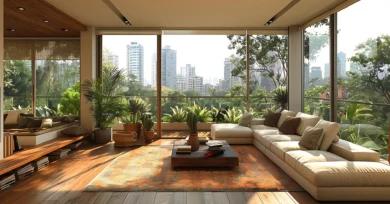Decluttering your space is more than just a chore; it’s a transformative process that can significantly enhance your life. In this section, we will delve into the fundamental aspects of decluttering, providing a comprehensive understanding of its importance and the myriad benefits it offers, all aimed at igniting your motivation to declutter.
Understanding the Importance of Decluttering
Decluttering is not merely about tidying up your living space; it’s about making room for a more fulfilling life. By eliminating excess belongings and organizing your surroundings, you create a harmonious environment that fosters mental clarity and emotional well-being. Understanding the importance of decluttering involves recognizing how a clutter-free space can alleviate stress, reduce anxiety, and enhance your overall quality of life. Moreover, it promotes a sense of control and order, allowing you to focus on what truly matters.
Benefits of a Clutter-Free Environment
A clutter-free environment yields a plethora of benefits that extend far beyond aesthetics. When your space is organized and free from unnecessary items, you experience improved concentration and enhanced productivity. Your home becomes a sanctuary, promoting relaxation and creativity. Additionally, maintaining a clutter-free environment can save you time and money, as you’ll spend less energy searching for lost items and be less inclined to buy things you don’t need. Ultimately, a clutter-free space empowers you to lead a more intentional and purposeful life, enriching your overall well-being and providing the motivation to declutter that you need to embark on this transformative journey.
Setting Your Decluttering Goals
Decluttering can feel like a daunting task, but setting clear goals can make the process more manageable and motivating.
Identifying Problem Areas in Your Home
Begin by identifying the specific areas in your home that need decluttering. Whether it’s your overflowing closet, cluttered kitchen counters, or a chaotic home office, pinpointing these problem areas provides focus and direction.
Defining Clear and Achievable Goals
Once you’ve identified the problem areas, define your goals clearly. Make them specific, measurable, and achievable within a given timeframe. For example, set a goal to declutter your closet within a week or organize your kitchen cabinets over the weekend. Clear goals provide a roadmap and a sense of accomplishment as you progress.
Overcoming Procrastination
Procrastination can be a significant hurdle in the journey toward a clutter-free space. Overcoming this hurdle requires both mental preparation and creating a conducive environment that fosters motivation.
Dealing with Procrastination and Avoidance
Acknowledge your tendency to procrastinate and actively work against it. Break tasks into smaller, more manageable parts. Instead of aiming to declutter the entire room at once, focus on one shelf or a drawer. This approach makes the task less overwhelming and helps you get started.
Creating a Motivational Environment
Surround yourself with motivation. Display inspiring quotes, visualize your ideal clutter-free space, or create a decluttering playlist. A motivational environment can boost your energy and enthusiasm, making the process seem less like a chore and more like a rewarding challenge.
Start Small, Think Big
When it comes to decluttering, starting small can lead to significant transformations over time. By breaking down tasks into smaller steps and adopting a micro-organizing mindset, you can achieve macro results efficiently.
Breaking Down Decluttering Tasks into Manageable Steps
Instead of trying to tackle an entire room in one go, divide it into smaller tasks. For instance, focus on organizing a single drawer, sorting through one box, or cleaning out one corner. These manageable steps make the process less overwhelming and allow you to see progress quickly.
Focusing on Micro-Organizing for Macro Results
Micro-organizing involves organizing at a detailed level, such as arranging items within a drawer or categorizing belongings by type. This meticulous approach leads to macro results, transforming the overall organization of your space. By paying attention to the small details, you create a ripple effect of order throughout your home, enhancing the sense of accomplishment and motivation to declutter further.
The Power of Decluttering Mindset
Decluttering isn’t just about organizing your physical space; it’s also about cultivating a positive mindset that fuels your motivation to declutter. When you approach decluttering with the right attitude, it can transform the process from a chore into a fulfilling journey towards a clutter-free life.
Adopting a Positive Attitude Towards Decluttering
One of the first steps in finding motivation to declutter is adopting a positive attitude. Instead of viewing decluttering as a daunting task, consider it as an opportunity for a fresh start. Embrace the idea that letting go of unnecessary items creates space for positive energy and new experiences. Cultivating this mindset makes the entire process more enjoyable and manageable.
Embracing Minimalism: Less Stuff, More Happiness
Minimalism is a lifestyle that focuses on owning less and finding contentment in simplicity. By embracing minimalism, you shift your focus from acquiring material possessions to cherishing meaningful experiences and relationships. This mindset shift not only declutters your physical space but also declutters your mind, leading to a sense of freedom and enhanced well-being. Understanding that true happiness comes from experiences and connections rather than possessions provides the motivation to declutter and simplify your life.
Utilizing Effective Decluttering Techniques
Equipped with a positive mindset, it’s time to implement effective decluttering techniques that align with your newfound motivation to declutter. These techniques are designed to simplify the process, making it efficient and less overwhelming.
KonMari Method: Organizing by Joy
Marie Kondo’s KonMari Method emphasizes organizing by joy. This technique involves going through your belongings category by category and keeping only the items that spark joy in your life. By focusing on what brings you happiness, you create a living space filled only with things that have a positive impact, enhancing your overall well-being.
4-Box Method: Sort, Keep, Donate, Discard
The 4-Box Method simplifies decision-making during decluttering. As you go through your items, categorize them into four boxes: things to keep, things to donate, things to discard, and things to further consider. This method provides clarity, helping you quickly sort through your belongings and make rational choices about what stays and what goes.
One-In, One-Out Rule: Maintaining Balance in Your Space
To prevent future clutter, adopt the one-in, one-out rule. For every new item you bring into your home, remove an existing item. This approach ensures that your space remains balanced, discouraging unnecessary accumulation and encouraging mindful consumption.
Getting Creative with Storage Solutions: Maximizing Your Space
Decluttering your home is not just about getting rid of things; it’s also about finding smart storage solutions that make the most out of the space you have. Here are effective methods to creatively organize your belongings and deal with sentimental items, providing the motivation to declutter and maintain a clutter-free environment.
Utilizing Space-Saving Furniture and Organizers
Investing in space-saving furniture can significantly transform your living area. Consider multifunctional pieces like ottomans with hidden storage or beds with built-in drawers. These items serve dual purposes, offering comfort and style while also providing hidden storage spaces. Additionally, wall-mounted shelves, cabinets, and hooks can help you utilize vertical space, keeping your floors clear and open.
DIY Storage Hacks to Maximize Your Space
If you enjoy hands-on projects, there are numerous DIY storage hacks that can expand your storage options inexpensively. Repurpose old crates into stylish bookshelves, use tension rods to create additional shelving in cabinets, or hang pegboards in your kitchen to organize utensils and pots. These creative solutions not only declutter your space but also add a touch of uniqueness to your home decor. The satisfaction of creating functional storage with your own hands can serve as a powerful motivation to declutter further.
Dealing with Sentimental Items: Balancing Memories and Minimalism
Sentimental items often pose a challenge when decluttering. It’s essential to strike a balance between preserving memories and embracing minimalism. Here’s how you can handle sentimental clutter effectively:
Letting Go of Sentimental Clutter
Begin by carefully evaluating each sentimental item. Ask yourself if the item holds genuine sentimental value or if the memory associated with it can be preserved through photographs or other mementos. Acknowledge that letting go doesn’t mean letting go of the memory itself; it’s about making room for new experiences and memories.
Preserving Memories without Physical Clutter
Consider digitizing sentimental items like letters, cards, and photographs. Create digital albums or scan handwritten notes to keep the memories alive without occupying physical space. Another creative idea is to transform sentimental fabrics into quilts or pillows, merging cherished memories with functional decor elements. By finding innovative ways to preserve memories, you can part with physical items more easily, enhancing your living space and providing the motivation to declutter with a purpose.
Staying Consistent and Preventing Future Clutter
Decluttering isn’t a one-time task; it’s a continuous process that requires consistency and mindful habits. By incorporating daily and weekly decluttering routines, you can maintain the cleanliness and organization of your space effortlessly.
Creating Daily and Weekly Decluttering Routines
Establish a daily routine that includes dedicating a few minutes each day to decluttering specific areas of your home. For instance, spend 10 minutes every morning tidying up your bedroom or clearing your kitchen countertops. Weekly routines can involve more thorough tasks like organizing your closet or sorting through your mail. Consistency in these routines is key to preventing clutter from piling up again.
Mindful Shopping: Avoiding Impulse Buys and Over-Accumulation
One of the major contributors to clutter is impulse buying and over-accumulation. Stay motivated to declutter by being mindful of your purchases. Before buying something, ask yourself if it’s a necessity or if it genuinely adds value to your life. Avoid impulsive shopping and focus on acquiring items that align with your needs and values. By doing so, you reduce the influx of unnecessary items, preventing future clutter buildup.
Celebrating Your Decluttering Success
Acknowledging your progress and celebrating your achievements is essential for staying motivated to declutter in the long run. Recognize the milestones you’ve reached and reward yourself for your hard work and dedication.
Acknowledging and Rewarding Your Achievements
Take a moment to acknowledge the effort you’ve put into decluttering. Whether you’ve cleared out a whole room or just organized your desk, celebrate these achievements. Acknowledge the positive changes in your living space and how it positively impacts your daily life. This acknowledgment can reinforce your motivation, making it easier to continue your decluttering journey.
Maintaining a Clutter-Free Lifestyle: Tips for Long-Term Success
To ensure your motivation to declutter stays strong, adopt habits and practices that support a clutter-free lifestyle in the long term.
- Regular Assessments: Periodically evaluate your belongings. If you haven’t used an item in the last six months to a year, consider donating or discarding it.
- Mindful Consumption: Continuously educate yourself about mindful living and minimalist philosophies. Stay inspired by success stories and the benefits of a clutter-free life.
- Incorporate Simplicity: Simplify your life by embracing simplicity in all aspects, from your wardrobe to your home decor. The more straightforward your lifestyle, the easier it is to maintain a clutter-free environment.
- Encourage Others: Spread the positivity of decluttering by encouraging your friends and family to do the same. Create a supportive network where you can share tips and motivate each other to maintain clutter-free spaces.
Conclusion
Finding the motivation to declutter is the first step toward a more organized, peaceful life. By implementing the tips and tricks discussed in this article, you can not only transform your immediate living space but also cultivate habits that promote long-term cleanliness and order. Remember, consistent effort, mindful shopping, and celebrating your achievements are the cornerstones of a clutter-free lifestyle. Embrace the journey of decluttering as an ongoing process, and with determination and persistence, you can create a home environment that fosters tranquility, productivity, and overall well-being. Happy decluttering!
Read More:






